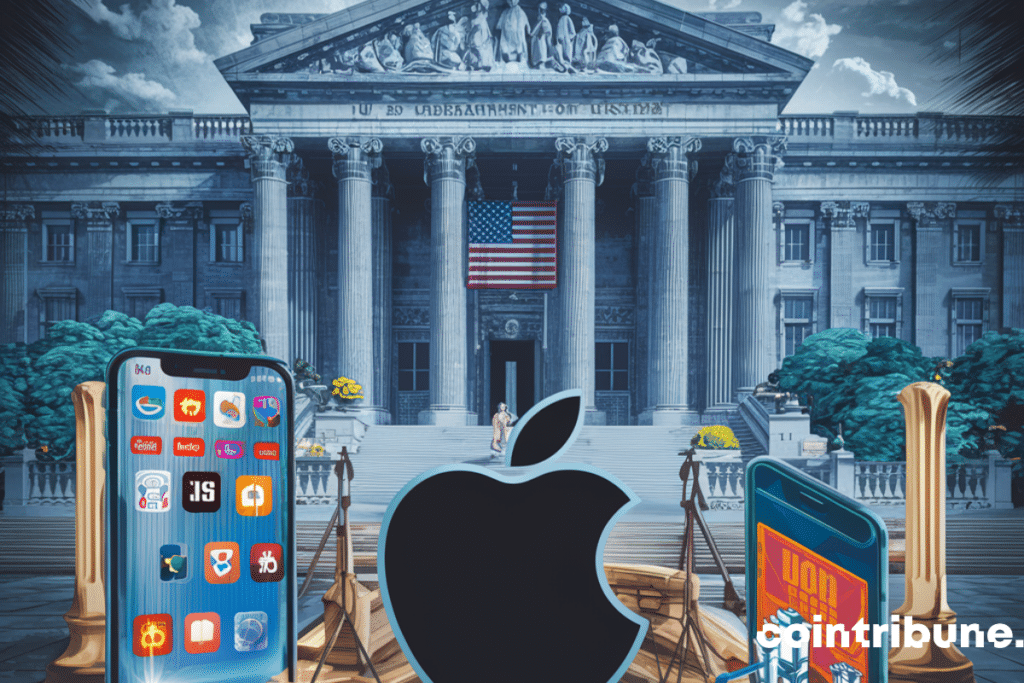Legal tug-of-war between Apple and the DOJ: The fate of crypto apps on iOS at stake
The United States Department of Justice (DOJ) has launched a major antitrust offensive against Apple. According to the DOJ, the tech giant’s App Store rules hinder competition and stifle innovation, particularly in the crypto sector, arbitrarily penalizing developers in favor of Apple’s monopoly.

Apple under the DOJ’s Scrutiny for Anti-competitive Practices
This Thursday, March 21, the United States Department of Justice (DOJ), backed by 16 state attorneys general, filed a lawsuit against Apple, alleging that the company’s App Store rules and monopolistic power inhibit competition and suppress innovation, especially in the crypto sector.
The DOJ claims that Apple holds a monopoly in the smartphone market, which it uses to compel developers to adhere to its ever-changing rules and restrictions. According to the department, these practices allow Apple to impose higher fees, thwart innovation, and suppress competitive alternatives.
App Store guidelines and agreements with developers enforce a proprietary payment system, thereby locking developers and users into the Apple platform. This situation has repercussions across multiple sectors, including financial services and cryptocurrencies.
Apple’s 30% tax, levied on apps and in-app purchases, is central to the issue. This fee, combined with Apple’s payment systems’ incompatibility with crypto, has made it economically unfeasible for many crypto apps to offer in-app purchases.
While Apple does offer some enterprises and public sector customers the option to offer their own apps through custom app shops, App Store users and developers do not have access to them, as they would compete with the company’s fees.
Arbitrary Rules that Penalize Crypto Applications
According to the Justice Department, Apple often applies its App Store rules arbitrarily, penalizing and restricting developers utilizing technologies that threaten its monopolistic power.
Crypto-related applications have been particularly hard hit. Some non-fungible token (NFT) marketplaces, such as OpenSea, have had to disable functionalities on their iOS apps due to the 30% fee levied on NFT sales.
The social application Damus was also forced to remove a BTC tipping feature after Apple removed it from the list for not using its in-app payment system.
Even web applications, accessible via a browser and outside the App Store, remain under Apple’s control, which demands the use of its WebKit navigation engine.
The DOJ further asserts that Apple has denied access to competing digital wallets featuring enhanced functionalities.
Apple Defends Itself Citing Privacy and Security
In response to these allegations, an Apple spokesperson stated to Cointelegraph that the lawsuit is “misguided in both fact and law” and that the company would defend itself vigorously. Apple believes that the lawsuit would set a dangerous precedent by giving the government the power to interfere with technology design.
In Europe, Apple has had to open up under regulatory pressure, while still maintaining a right of oversight in the name of user privacy and security.
This lawsuit highlights the growing tensions between tech giants and regulators eager to stimulate competition in a rapidly evolving digital market, especially in decentralized finance (DeFi). The outcome will be decisive for the future of crypto applications and the influence of big tech firms like GAFAM.
Maximize your Cointribune experience with our "Read to Earn" program! For every article you read, earn points and access exclusive rewards. Sign up now and start earning benefits.
Passionné par le Bitcoin, j'aime explorer les méandres de la blockchain et des cryptos et je partage mes découvertes avec la communauté. Mon rêve est de vivre dans un monde où la vie privée et la liberté financière sont garanties pour tous, et je crois fermement que Bitcoin est l'outil qui peut rendre cela possible.
The views, thoughts, and opinions expressed in this article belong solely to the author, and should not be taken as investment advice. Do your own research before taking any investment decisions.